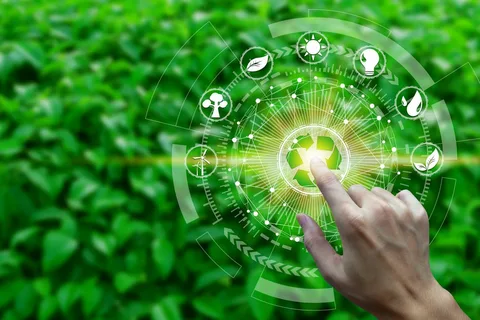Future-Ready Digitizing Services in 2025: AI & Sustainability Transform Embroidery

Introduction
In a world rapidly embracing sustainability and artificial intelligence, the embroidery and textile industries are not being left behind. The integration of AI-driven digitizing services with eco-conscious textile manufacturing is reshaping how fashion brands and embroidery businesses operate. As we step into 2025, understanding how these transformative forces work together is critical for businesses that aim to remain competitive and responsible.
This guest post delves into the next-generation trends of digitizing services, focusing on the unique intersection of AI technology and sustainable practices. Whether you're a startup, a digitizing professional, or a fashion entrepreneur, this guide is your one-stop resource for future-proofing your business.
🌱 Section 1: The Evolution of Digitizing Services
What Are Digitizing Services?
Digitizing services convert artwork or designs into a digital file that embroidery machines can interpret. The process ensures every stitch follows the intended pattern precisely, whether it’s a logo, monogram, or complex image.
How Digitizing Has Changed Over the Years
-
Manual Stitch Mapping (Pre-2000s)
-
Software-Assisted Design (2000–2015)
-
Cloud-Based & AI-Supported Platforms (2016–2024)
2025 is ushering in the era of AI-powered eco-smart digitizing platforms, which optimize both performance and sustainability.
🤖 Section 2: How AI Is Revolutionizing Digitizing Services
1. Predictive Stitch Logic
AI uses machine learning to predict the best stitch types, reducing test runs and thread waste.
2. Image Optimization
Advanced neural networks can now detect low-resolution artwork and clean it up for high-quality digitizing, reducing the need for manual corrections.
3. Workflow Automation
Automated workflows powered by AI allow one-click processing, real-time previews, and cloud-syncing for teams across the globe.
4. Custom Learning Models
AI systems now learn from your digitizing history to recommend optimal solutions for similar future projects.
🌿 Section 3: The Rise of Sustainable Digitizing Practices
Sustainability in digitizing isn’t just about using organic threads—it's about responsible data use, waste reduction, and smarter production cycles.
1. Eco-Friendly Thread & Fabric Recognition
AI-integrated digitizing platforms can now recommend stitch density based on fabric composition, helping to reduce thread use.
2. Reduced Carbon Footprint via Smart Sampling
Less back-and-forth sample production means fewer emissions. Smart sampling using virtual visualization minimizes physical trials.
3. Energy-Efficient File Optimization
Files optimized for stitch efficiency use less machine energy and reduce wear-and-tear on embroidery heads.
🌍 Section 4: Real-World Examples of AI + Sustainability in Digitizing
Case Study 1: EcoThread Co. (USA)
Used AI-powered digitizing to cut fabric waste by 40% and energy consumption by 22%.
Case Study 2: GreenStitch Europe
Integrated a smart digitizing workflow that adjusted density for recycled threads, improving quality without increasing thread usage.
🔄 Section 5: How to Transition to Future-Ready Digitizing Services
1. Audit Your Current Setup
Assess the efficiency of your current digitizing platform. Are you wasting threads? Is your software outdated?
2. Choose the Right AI-Driven Platform
Platforms like Wilcom AI, StitchLab Pro, and EmbroVision offer smart digitizing tools that support sustainability.
3. Train Your Team
Adoption is only successful if your team is ready. Conduct in-house or online training on the new eco-AI tools.
4. Collaborate with Sustainable Suppliers
Work with partners who offer eco-threads, solar-powered embroidery services, or closed-loop textile systems.
📈 Section 6: Market Forecast & Trends for 2025
| Trend | Description | Impact |
|---|---|---|
| AI-Driven Optimization | Real-time stitch correction | +35% efficiency |
| Sustainable Threads | Biodegradable & recycled | -50% waste |
| Cloud-Based Embroidery Platforms | Remote team access | +40% collaboration |
| 3D Embroidery Preview | AR/VR tech | -70% physical samples |
🛠 Section 7: Tools & Platforms to Watch in 2025
1. StitchBrain AI
Self-learning software that improves with every design processed.
2. EcoDigit Pro
Provides sustainability metrics after every digitizing job.
3. GreenMesh Toolkit
Predicts thread wastage based on design and provides greener alternatives.
💡 Section 8: Future Innovations to Look Out For
-
Quantum Embroidery Engines
-
Real-Time Carbon Tracking per Design
-
AI-generated design concepts with built-in stitch patterns
🔚 Conclusion: Be Future-Ready Today
The merging of AI and sustainability is more than just a trend—it’s the next chapter of embroidery digitizing. Businesses that adapt now will benefit from cost reductions, enhanced branding, and a significant edge in a competitive market.
Now is the time to upgrade your workflow, switch to eco-conscious digitizing platforms, and embrace the AI-powered, sustainable future of textile innovation.
✅ Final Checklist for Businesses:
-
Adopt AI-enhanced digitizing software
-
Train your team on sustainable practices
-
Partner with green supply chains
-
Market your eco-conscious embroidery offering
